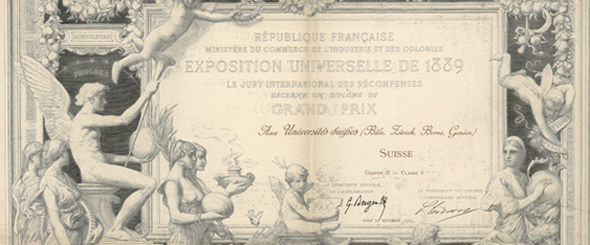National and international context
International developments and debates in national education policy have left a lasting mark on the University of Basel, and this was especially true in the nineteenth and twentieth centuries. But even in the centuries before that, Basel often found itself to be the focus of new currents and a location where new ideas and people hungry for knowledge came together from around the world.
Since the founding of its university, Basel has attracted scholars and students from all over Europe. There are many reasons why: Basel offered a humanist environment respected across Europe; it had been aligned since 1532 with the Reformation; and its location on the border with Germany and France was not insignificant for the many travelers seeking cultural enrichment and for the refugees who streamed through Europe in the early modern period and in the nineteenth century.
University, city, and international interests came together at the beginning of the nineteenth century when numerous liberal professors fled Germany, some of whom managed to obtain professorships in Basel. The appointments of faculty from the German opposition gave Basel the reputation of being a “nest of demagogues,” but the university and the city benefited from immigrants, including such well-known names such as Wilhelm Martin de Wette, Carl Gustav Jung, and Wilhelm Wackernagel (though he was not truly in exile).
A special form of international cooperation presented itself to Swiss universities during the interwar period through the establishment of the Commission international de cooperation intellectuelle under the League of Nations. Leading intellectuals from a number of countries, including Albert Einstein, Marie Curie, and Thomas Mann, worked to promote international understanding through international exchange programs focused on aims that included fostering intellectual collaboration at and between universities.
Later, these and other efforts resulted in various forms of institutional cooperation, based partly on personal relationships (such as the Virtual Seminar with Chelyabinsk), and partly on political decisions (such as the Confederation of Upper Rhine Universities, known as EUCOR). These experiences have repeatedly made it clear that the university, as part of the national and international higher education landscape, can and must respond to various currents of the day and find ways to integrate many different actors. Examples are the discussions about the foundation of a Swiss federal university in the eighteenth and nineteenth centuries as well as the issue of Basel-Countryside joining Basel-City as a cosponsor of the university.



